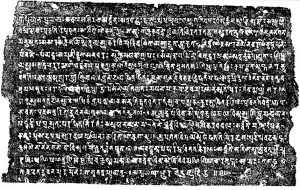
Ôm! Victorious for a very long time is that doctrine, replete with fame, of the Teacher, the chief kinsman of the Śâkyas, by which, lustrous as the full-moon, the inscrutable primary substance of existence has been pervaded in all directions; by which the warriors, who are heretics, obstructive of the path of beatitude, have been broken to pieces, being assailed with the weapon of logic; (and) by which the whole treasure of religion, that had been stolen by the enemy which is original nature, has been recovered for the welfare of mankind!
(Line 2.)—May be, Mahâ-Kâśyapa, who is worthy of praise, protect you,—he who observed the precepts of (Buddha) the chief of saints; who practised that auspicious habit of abstract meditation which is of the nature of a trance; who overcame the anguish of successive states of existence; whose wonderful subjugation of the passions in final emancipation (is to be) displayed in the land of Maitrêya; and by whom the two pure feet of (Buddha) the saint were beheld at the time of attaining nirvâna!
(L. 4.)— His disciples, endowed with a connected tradition of doctrine, purified as to (their) emotions, (and) active in compassion for existing beings, roamed at one time over the stainless country at the feet of the mountains of Lankâ; and in succession from them there were born, in hundreds, disciples and disciples’ disciples, possessed of the virtue of (good) character, who, without the glory of (actual) sovereignty, were the ornaments of a lofty race of kings.
(L. 6.)—Then there was the Śramaṇa Bhava, whose welfare was effected by the development of abstract meditation; who discriminated between good and evil; who destroyed error; (and) who possessed an unequalled wealth of true religion.
(L. 7.)—And his discipline (was) he who had the name of Râhula; after whom (there came) the ascetic Upasêna (I.); then in succession (there was) Mahânâman (I.); (and) after him another Upasêna (II.), whose special characteristic of affection, of the kind that is felt towards offspring,—for any distressed man who came to him for protection, and for any afflicted person whose fortitude had been destroyed by the continuous flight of the arrows of adversity,—extended, in conformity with the disposition of a kinsman, (even) to any cruel man who might seek to do (him) harm; (and) by whose fame, arising from good actions, the whole world was thus completely filled.
(L. 9.)—His discipline, greater (even than himself), (is) he who has the excellent name of Mahânâman (II.); an inhabitant of Âmradvîpa; a very ocean of a mighty family; born in the island of Lankâ; delighting in the welfare of others;—by him this beautiful mansion of the Teacher of mankind, who overcame the power of (the god) Smara,— dazzling white as the rays of the moon, with an open pavilion on all sides,—has been caused to be made at the exalted Bôdhimaṇḍa.
(L. 11.)—By means of this appropriate (action), let mankind,—freed from attachment to wordly things; having the condition of (mental) darkness dispelled; (and), like (the flame of) a torch, having no adhesion (to material objects),—enjoy the supreme happiness of perfect wisdom!
(L. 12.)—As long as the sun, the dispeller of darkness, shines in all directions with diffused rays; as long as the ocean (is) full on all sides with its circles of waves that are curved like the hoods of hooded snakes; and as long as (the mountain) Sumêru, the abode of (the god) Indra, has its summits made beautiful by various jewelled slabs, in such a way as to be full of lustre,—so long let this temple of the great saint attain the condition of being everlasting!
(L. 14.)—The year 200 (and) 60 (and) 9; (the month) Chaitra; the bright fortnight; the day 7.